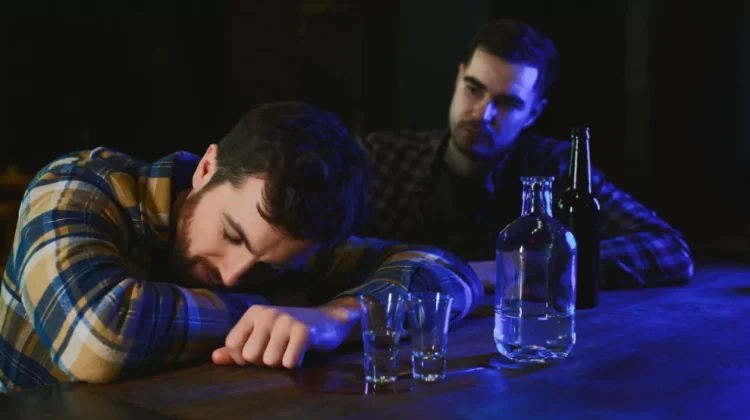
How to Help a Friend Struggling with Binge Drinking
Binge drinking—consuming large amounts of alcohol in a short period, often to the point of intoxication or blacking out—is harmful in the moment, but if it becomes habitual, it can have serious long-term effects on both physical and mental health.
If your friend has carried college drinking habits into adulthood and seems unable to moderate their alcohol use, your support could be life-changing. Even if they don’t yet recognize the issue, if you’ve observed consistent signs of over-drinking, it’s worth addressing. Here are some thoughtful ways to help:
1. Choose the Right Time: Make It a Sober Conversation
It may be tempting to talk things out over a drink, but alcohol can quickly derail a serious discussion about drinking. Pick a calm, sober moment to talk. Your message will come through more clearly, and your friend is more likely to take it seriously.
2. Explore the “Why” Behind the Drinking
Many people use alcohol to cope with anxiety, loneliness, or stress—especially in the aftermath of global stressors like COVID-19. Ask gentle, open-ended questions to understand the root cause of their drinking. Helping them address what’s driving the behavior is more effective than simply asking them to stop.
3. Expect Some Pushback
Not everyone responds positively to being confronted about their behavior. Your friend might get defensive or angry—and that’s okay. Stay calm and nonjudgmental. Their reaction is more about what they’re going through than anything you’ve done. Be patient and let the conversation unfold naturally.
4. Offer a Way Forward
Don’t just point out the problem—offer a solution. Come prepared with ideas, such as cutting back together, attending social events without alcohol, or suggesting professional help. If you’ve done some research on local therapists, support groups, or sober communities, sharing those resources can be a powerful gesture.
5. Be There for the Long Haul
Recovery is a journey, not a one-time fix. Offer regular check-ins—not necessarily formal ones. Weekly hangouts, whether it’s a coffee date, a workout, or game night, give your friend healthy, alcohol-free alternatives and show that you’re genuinely invested in their well-being.
6. Watch for Signs of Relapse
Relapse can happen, especially after a stressful or emotional event. Stay connected with your friend’s life—ask how they’re doing, show up for important moments, and always be available to listen without judgment.
Final Thoughts
Helping a friend through binge drinking takes patience, empathy, and commitment. They may not thank you right away—but your concern, consistency, and willingness to act could make all the difference. Even small steps can set someone on the path toward healing.
If you’re looking for more resources or professional guidance, start here:
👉 SAMHSA National Helpline – Free, confidential support 24/7
How to Help a Friend Suffering from Binge Drinking
Understand What Binge Drinking Is
Binge drinking is defined as consuming a large amount of alcohol in a short period — typically 5+ drinks for men or 4+ drinks for women in about 2 hours. It’s often linked to risky behaviors, accidents, blackouts, and long-term health problems. It can also signal deeper emotional or mental health issues.
Steps to Support Your Friend
1. Approach Them With Care
- Choose a calm, private moment when your friend is sober.
- Use “I” statements instead of blame:
“I’ve noticed you’ve been drinking a lot lately, and I’m worried about you.” - Be compassionate, not confrontational.
2. Listen Without Judgment
- Allow them to talk about what’s going on.
- Avoid lecturing or shaming.
- Express your concern and let them know you’re there for them.
3. Encourage Professional Help
- Suggest they speak with a doctor, therapist, or addiction specialist.
- You can say:
“There are people who can help you feel better and more in control—have you thought about talking to someone?” - Offer to help find resources or go with them to an appointment if they’re open to it.
4. Avoid Enabling
- Don’t cover up for their behavior (e.g., making excuses, cleaning up after them).
- Avoid drinking around them or inviting them to alcohol-centered events.
- Set healthy boundaries while remaining supportive.
5. Educate Yourself
- Learn about alcohol use disorder and binge drinking.
- Understand that recovery is a process—it can take time, setbacks may happen, and support matters.
6. Encourage Healthy Activities
- Invite your friend to social events or activities that don’t involve alcohol.
- Promote habits like exercise, hobbies, or volunteering that can help replace drinking.
7. Take Care of Yourself
- Supporting someone through addiction is emotionally demanding.
- Seek support for yourself if needed—from a counselor, a trusted adult, or support groups like Al-Anon (for families and friends of problem drinkers).
When to Seek Immediate Help
If your friend is in danger — e.g., passed out and unresponsive, showing signs of alcohol poisoning, or expressing suicidal thoughts — call emergency services right away.
📚 Helpful Resources
- SAMHSA National Helpline (U.S.) – 1-800-662-HELP (4357)
Free, confidential support 24/7 - Alcoholics Anonymous (AA)
- Al-Anon Family Groups
- National Institute on Alcohol Abuse and Alcoholism (NIAAA)
Conclusion
You can’t “fix” your friend, but you can be a supportive presence. Your empathy, consistency, and encouragement can help them take the first steps toward change. If they’re not ready to get help right away, stay patient—just knowing someone cares may be enough to spark progress later.
Let me know if
